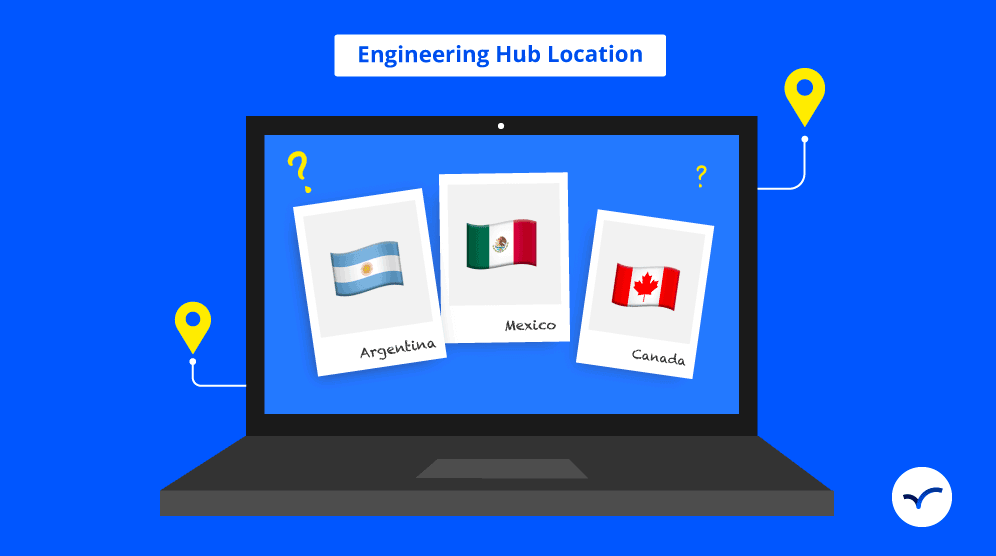Are you choosing among Argentina, Mexico, and Canada as to where to host your distributed engineering team?
A report by the App Association found for every eight available computing jobs, there is only one US computer science grad available to fill it. In 2018, 59,000 US college grads earned computer science degrees compared to 509,000 unfilled jobs.
With that vast talent gap, many successful companies are turning towards Canada, Mexico, and Argentina to bolster their software development teams and other needs. Here are some factors to keep in mind as you consider either hiring remote developers or building a satellite office within these countries.
Looking to hire the best remote talent? See how Arc can help you:
⚡️ Find the world’s top developers, designers, and marketers
⚡️ Hire 4x faster with fully vetted candidates
⚡️ Save up to 58% with global hires
Hire top talent with Arc risk-free →
Availability of Engineering Talent
Canada
Canada’s latest census showed that 18.6% of working-age Canadians graduated from STEM fields. A survey by the Conference Board of Canada found Canada ranked 12th out of 16 peer countries in this category. This put them ahead of the U.S. but behind countries like Finland, Germany, Austria, and France.
International tech talent also has a large presence in Canada helping strengthen the talent pool. Canada Study News cited that roughly one in three immigrants with a STEM degree earned it in Canada. This signifies many migrants study elsewhere before moving to Canada.
This talent is also more readily available than in the United States. A survey by Stack Overflow discovered over 15% of the Canadian developers polled are seeking work either as freelancers or a permanent position compared to 11% in the US.
Consistently high-ranked programs for computer science include the University of British Columbia in Vancouver, the University of Waterloo, and the University of Toronto. U of T’s computer science program has operated for over 50 years. They offer 11 specializations including artificial intelligence, human-computer interaction, and web technologies.
Read More: Here’s How to Motivate & Reward a Remote Engineering Team Effectively
Mexico
The Instituto Tecnológico y de Estudios Superiores de Monterrey (Tec de Monterrey) has over 30 campuses across 25 cities, becoming well known throughout the world for producing top talent. They also provide a joint master’s degree in information technology and software engineering management in collaboration with Carnegie Mellon University.
Formed in 1541, the National Autonomous University of Mexico (UNAM) is the oldest and largest university in Latin America. UNAM is home to the Centre for Applied Sciences and Technological Development which focuses on integrating science into real-world problems.
For post-undergraduate computer science studies, the National Polytechnic Institute of Mexico offers master’s degree and Ph.D. programs.
A number of social organizations such as Mexico City’s Hola Code and Mexican citizens returning from formal education in the United States all also help develop talent here.
Argentina
Bachelor’s degree programs in Argentina are unique: it’s not considered abnormal to spend 6–10 years completing undergraduate studies. Many programs include longer projects spanning 8–12 months for research, software development, testing, writing documentation, and presenting their software publicly.
Graduates of Buenos Aires Institute of Technology (ITBA) have one of the highest employment rates and salaries of any school in the country. The private university specializes in teaching and research in engineering, technology, and management. The University of Cordoba is the second-largest university in the country and provides real-world experience to students through:
- Research in private R&D centers
- Internships
- Work and research in national or European public centers like Centro de Investigaciones Energéticas, Medioambientales y Tecnológicas in Madrid
Argentina also has a strong base of self-learners. Coursera’s Global Skills Index report cites Argentina as the number one country for technological skill proficiency based on the assessments taken within their courses.
Read More: Synchronous vs Asynchronous Communication for Remote Teams
Government Incentives
Countries seeking investment from tech companies often offer significant incentives to make themselves attractive locations. As these incentives often change, ensure you do your own research.
Tax Relief and Business Stimulus Offerings in Canada
The Scientific Research and Experimental Development (SR&ED) program offers tax incentives to encourage research and development in Canada. This includes deductions on expenditures and tax credits to reduce payable income tax. Canada’s Strategic Innovation Fund has also provided businesses with over $2 billion for R&D, firm expansion, and other funding streams.
Provincial incentives include BC’s Interactive digital media tax credit, which is 17.5% of eligible salary and wages that occurred during the tax year (the scheme ends for products developed after 1 September 2023).
Tax Incentives for Businesses Working in Mexico
The Mexican government recently introduced tax incentives for new businesses opening up along the border with the U.S. The presidential decree grants a temporary income tax credit and reduced value-added tax (VAT) rate to certain taxpayers in 43 municipalities within the northern border region. This region includes:
- Baja California Norte
- Sonora
- Chihuahua
- Coahuila de Zaragoza
- Nuevo León
- Tamaulipas
Some state governments will grant incentives to attract new industries to specific areas in the form of reduced prices for land and reductions in property and payroll taxes.
Read More: How to Transition to a Remote Engineering Team: The CTO’s Cheat Sheet
Talent Development and Business Incentives in Argentina
Argentina has a wide range of initiatives to encourage talent development and business growth. Their government-sponsored program, Plan 111Mil aims to train over 100,000 developers. Argentina’s Entrepreneur’s Law also promotes business registration within 24 hours.
In June 2019 Argentina introduced Argentina Law 27506 aimed to provide tax incentives to attract technology businesses to have a presence. Tax benefits include:
- Reduced income tax rate from 25-30% to 15%
- Exemption from value-added tax
- Deduction of a fixed amount of employer contributions
- Tax credit for the payment of income tax and value-added tax
You can also try Arc, your shortcut to the world’s best remote talent:
⚡️ Access 350,000 top developers, designers, and marketers
⚡️ Vetted and ready to interview
⚡️ Freelance or full-time
Try Arc and hire top talent now →
Time Zone Compared to the USA
For many companies, the time zone of their remote developers is very important. Fortunately, each of these countries shares overlapping business hours with the United States — helping to also make them attractive as potential engineering hub locations.
Canada
Canada spans six time zones, with four shared by the United States: Pacific Standard Time (UTC – 8 hours), Mountain Standard Time (UTC – 7 hours), Central Standard Time (UTC – 6 hours), and Eastern Standard Time (UTC – 5 hours).
Mexico
The entire country spans four time zones. However, the majority of Mexico uses Central Time with Baja California also running on Pacific Standard Time. This allows for real-time collaboration for US-based companies.
A flight from New York, Seattle, San Francisco, and other major tech centers is no more than a six-hour ordeal from most of the country.
Argentina
Argentina uses the UTC − 3 hours time zone, putting the country two hours ahead of Eastern Standard Time.
Argentina decides whether to observe daylight saving time on a year-by-year basis. Each province may opt out of the federal decision. Currently, Argentina does not observe daylight saving time.
Read More: How to Work Across Time Zones as a Remote Team: Best Practices
English Proficiency
Expertise in Additional Languages in Canada
English is one of the official languages of Canada. While Canada may be well known for being bilingual due to the Québec province, 21% of Montrealers can speak at least three languages. In some of Canada’s other vastly diverse cities, like Vancouver and Toronto, an estimated one out of ten people are trilingual.
English Proficiency in Mexico
Engineering talent living on the border can be bicultural and bilingual, offering a valuable cultural connection and fresh perspective to brands. EF found the country’s three cities with the most English proficiency are Mexico City, Monterrey, and Guadalajara.
English Proficiency in Argentina
Roughly 6.5 million Argentines speak English. According to EF EPI rankings they also have the top English skills for a Latin American country.
Read More: How to Integrate Freelance Software Developers Into Your Current Team
Cost of Talent
Beyond even the largest tech centers in the United States like Silicon Valley, you’ll see the salary figures we discovered are considerably less expensive than any part of the States.
With the talent available in each of these countries, your team has opportunities to invest the savings back into your company’s continued growth.
Developer Salaries in Canada
The average annual salary for a senior developer in Canada is $79,206 USD. Monthly senior engineer salaries by city:
Montreal $5,300 USD
Ottawa $5,955 USD
Toronto $5,676 USD
Vancouver $5,276 USD
According to Indeed, salaries for full-stack developers include:
Montreal $4,645 USD
Ottawa $4,920 USD
Toronto $6,435 USD
Vancouver $4,668 USD
Front-end developers:
Montreal $4,657 USD
Ottawa $4,354 USD
Toronto $5,710 USD
Vancouver $5,116 USD
Back-end developers:
Montreal $4,782 USD
Ottawa $5,199 USD
Toronto $6,638 USD
Vancouver $5,733 USD
One big advantage for companies is the country’s publicly funded healthcare system. Medicare, however, does not completely cover expenses like prescriptions, dentistry, and optometry.
Developer Salaries in Mexico
From LinkedIn salary data, a senior developer in Mexico makes just over $19,000 USD annually.
Monthly salaries in specific regions for senior developers according to Glassdoor:
Mexico City $2,800 USD
Guadalajara $2,530 USD
Monterrey $2,045 USD
Tijuana $2,638 USD
For full-stack developers:
Mexico City $1,498 USD
Guadalajara $1,498 USD
Monterrey $1,343 USD
Tijuana $671 USD
Front-end developers:
Mexico City $1,447 USD
Guadalajara $1,602 USD
Monterrey $1,447 USD
Tijuana $1,809 USD
Developer Salaries in Argentina
The average monthly salary for a senior developer based in Argentina is $1,326 USD. The monthly salary for those positions by major cities (according to Glassdoor):
Buenos Aires $1,302 USD
Córdoba $1,348 USD
Rosario $1,380 USD
For full-stack developers:
Buenos Aires $1,078 USD
Córdoba $1,158 USD
Rosario $1,174 USD
Front-end developers:
Buenos Aires $1,077 USD
Córdoba $949 USD
Rosario $949 USD
Read More: On-Site vs Remote vs Distributed Engineering Teams: How to Choose?
Quality and Style of Life
Canada
The United Nations’ World Happiness Report looks at citizens around the world and how they perceive their lives. The latest report found Canada was one of the happiest countries in the world and the top country in the Americas.
In addition to a high life expectancy, the report also discovered Canadians found value in public programs like Group of 5 where any 5 Canadians can privately sponsor a newly arriving refugee family. With programs like this, Canadians also can form close social bonds that may otherwise not be available to them living in either a large metropolitan city or a more remote locale.
In terms of housing costs, Toronto is the most expensive place to rent in Canada. A one-bedroom flat in Toronto costs $1,224 USD. Other Canadian cities costs for a one-bedroom in their city centers:
Calgary $896 USD
Montreal $938 USD
Vancouver $1550 USD
Mexico
Unsurprisingly, the cost of living is considerably lower compared to the United States. A one-bedroom flat in the tech center of Mexico City costs roughly $484 USD on average. In Guadalajara, comparable places can be 40-50% cheaper to rent.
Developers in Mexico are optimistic. In a survey by Stack Overflow over 71% of Mexican developers stated they believe they’ll be able to live a better life than their parents.
Along with satisfaction with future perspectives, many Mexican citizens are happier about their health, achievements, and standard of life. However, based on the UN’s World Happiness Report, security continues to be a concern.
Argentina
Since the current political era began in 1983, Argentinians have enjoyed far more freedom than was previously possible. As one of the largest countries in the world, it’s a hotbed for adventure in a diverse range of settings from jungles to deserts.
The monthly rent for a one-bedroom in central Buenos Aires averages $263 USD. In Cordoba and Rosario, rents for an equivalent place within their city centers are roughly $175 and $183 USD (all pricing sourced from Numbeo).
Read More: How to Build and Maintain a Distributed Software Engineering Team
Tech Companies with Hubs in These Locations
Canada
Less stringent immigration policies inspire some US-based companies to open Canadian satellite offices. In 2016 Microsoft opened an office in Richmond, BC a few hours north of their world headquarters.
Microsoft’s Chief Legal Officer Brad Smith, in an interview with Geekwire, cited immigration policies in Canada that allow them to pull top talent from around the world.
Many tech brands with a huge presence, or making huge strides towards that, include Canadian talent on their teams. In the Pacific Northwest coast of Vancouver, Slack’s 21,000-square foot office houses front-end and iOS engineers, account managers, developer support, and other support teams. Other companies with engineering teams in Vancouver include:
- Amazon
- App Annie
- Asana
- Dialpad
- Electronic Arts
- Grammarly
- GroundTruth
- Mailchimp
- Postmates
- Salesforce
- Sauce Labs
- Splunk
- Tigera
- Tile
- Workday
- Zenefits
Uber recently opened its first Canadian engineering hub in Toronto with over 200 team members. Lever, Instacart, Zynga, Oracle, Etsy, and Coursera are a few of the other major companies with sizable presences here.
Just west of Toronto in Waterloo-Kitchener are development hubs for Carta, Index Exchange, and Google’s largest Canadian R&D office. In Quebec, Expedia, Airbnb, and Shopify all house 200+ team offices in Montreal.
Read More: Managing a Distributed Software Development Team: 5 Lessons Learned
Mexico
IBM was a pioneer for investing in talent within Mexico City with a large continued presence spanning over 85 years. Facebook, Oracle, and Cisco all also have talent here, along with Amazon’s research and programming facility in the nation’s capital.
Guadalajara invested over $20 million to create its tech district, Ciudad Creativa Digital; PayStand, Brightcove, IBM, Oracle, Intel, and other tech companies all have hubs in the city.
Directly south of Texas, Microsoft, Neoris, and Dell each house satellite offices. Monterrey is also home to the Research and Technological Innovation Park where over 30 organizations house their R&D teams.
Red Door Interactive, 3D Robotics, and other companies are taking advantage of Tijuana’s close proximity to the border just a few miles south of San Diego. A new border entry recently opened in the area. El Chaparral boasts 22 lines with the capacity to allow 100 cars a minute to cross.
Argentina
Tech giants like Facebook, Google, Amazon, and Microsoft all have hubs here.
OLX has a development team based in Buenos Aires. The end-to-end consumer trade site inspired by Craigslist is used in more than 45 countries and gets more than 300,000 users per month.
Argentina is the home base for one of Latin America’s largest and most successful tech companies, MercadoLibre. Roughly half of Latin America uses their site if they make a purchase online.
Despegar.com, the fifth-largest travel agent site, also has an office in Buenos Aires. Expedia owns a 16% stake in the company.
Many other companies are taking advantage of the development talent available in these regions.
Read More: The Best Remote Work Tools to Use According to Top Distributed Teams
Canada vs Mexico vs Argentina — Hire Developers
So where should you build your next engineering team, Canada, Mexico, or Argentina?
All three countries have plenty to offer an organization seeking to expand beyond U.S. borders, including a compatible time zone and plenty of both experienced and upcoming tech talent.
Ways to determine which location is most suitable for you include the weighting that you give to factors such as salary expenses, English skills, or visa availability. We trust this information will help you with your decision-making — but remember to also get specialized and localized information.
You can also try Arc, your shortcut to the world’s best remote talent:
⚡️ Access 350,000 top developers, designers, and marketers
⚡️ Vetted and ready to interview
⚡️ Freelance or full-time








